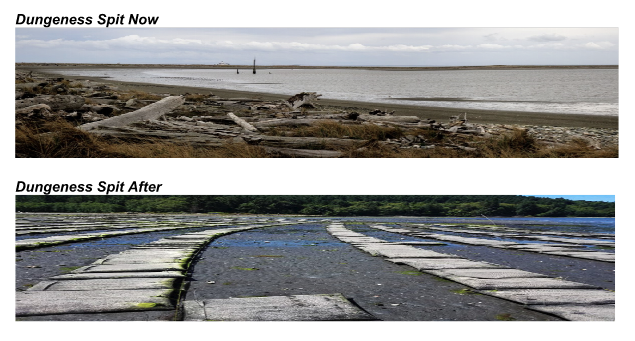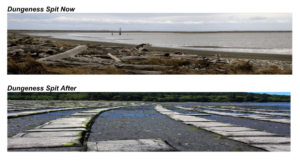Your Dungeness National Wildlife Refuge (DNWR) Spit is at Risk Help Save It!!

Natural Capital vs Industrial $
A corporation wants to industrialize the Dungeness National Wildlife Refuge to grow oysters for its corporate gain. National wildlife refuges are owned, operated and maintained by the public to enrich itself. The corporation intends to keep the birds from their feeding grounds so it can sell its non-native, plastic-bag-grown oysters abroad as well as to local restaurants.
Don’t Feed the Plastic to the Refuge
Humungous levels of plastic will be added to the marine ecosystem. This corporate plan is to immediately grow oysters in 20,000 highly toxic plastic bags with plans to increase the number to 80,000 bags. The project’s design is to anchor these bags to the sub-intertidal beds squarely in the major wild bird feeding area. After oysters grow to a particular size, they will be debagged and spread along 34 acres of the Refuge’s beach.
Don’t Starve the Birds
The projected toxic-plastic bottom bags will deny wild birds their nourishment by reducing the feeding area habitat by at least 50 percent. To find food, birds will have to peck through the plastic bags and will likely ingest the plastic, risking, as well, being caught in them. All sediment life beneath the bags will be smothered.
Don’t Impact Eelgrass Beds and Destabilize Refuge Functions
The entire dynamics of Dungeness Spit will be altered forever. It will shift this Refuge bird and bottomland community to one dominated by growing oysters. Oyster beds will severely inhibit eelgrass growth, critical to feeding forage fish, salmon and thousands of migrating birds. They will shift the natural, seasonal movement of the sediments, pushing more sediments into the eelgrass beds, and destabilize the functioning of the Refuge.
This industry attracts pathogens and invasive animals that affect shellfish. This corporation has permits to grow oysters and other shellfish at four other sites. Shellfish growers know that the warming weather is killing shellfish. The 2021 extreme heat conditions created major oyster graveyards around the U.S. – the shellfish baked in the heat when tides were out.
Keep the Dungeness National Wildlife Refuge wild!
Urgent !
It is urgent you write letters/emails telling Department of Natural Resources and US Fish and Wildlife Service rescind the Dungeness National Wildlife lease.
WRITE TO:
Office of the Commissioner of Public Lands
MS47001 USFWS Pacific Region
Olympia WA 98504cpl@dnr.wa.gov
……………………….
Robyn Thorson, Regional Director
Regional Director’s Office-R1
911 NE 11 th Avenue
Portland OR 97232-4181
Robyn_Thorson@fws.gov
……………………..
“Suggested Talking Points”
• Your agency agrees that significant harm will be done to the Dungeness National Wildlife Refuge (DNWR), yet has stepped aside to allow a 50-acre concentrated animal feed lot of 20,000 – 80,000 plastic bags of oysters to endanger the Refuge and starve the birds.
• Citizens of the United States overwhelmingly opposed this oyster project and were ignored. The US EPA disapproved. Even before the US Army Corps of Engineers (USACE) took public comment, it agreed to permit the project. The public must challenge this public slap-in-the-face.
• Your agency is mandated to protect our natural resources, not commercialize them for short-term corporate gain. We pay with our tax dollars to have you operate and maintain these lands for the good of wildlife protection. We demand that you withdraw the oyster project permits from the DNWR.
• Permitting agencies, including the USACE, admitted the incompatibility of shellfish farming with the purpose of the DNWR. The Public Lands’ staff has not denied this incompatibility.
• 50% reduction in bird primary feeding grounds
• Plastic oyster bags will exclude the probing shorebird flocks from feeding deeply into the substrate
• Plastic bags entrap fish and birds
• Plastic bags will fray, adding macro- and micro-plastic bits to the sediment throughout the Refuge
• The thousands of oyster bags, flush on the substrate, will shift the benthic community composition
• The ecological benefits provided by eelgrass to threatened fish and birds, such as nourishment and cover from predators, will be diminished..
• The operation’s release of nutrients in the water and the warming weather will increase algal blooms that will leave a graveyard of dead oysters
• Pathogenic oyster Denman Island Disease, oyster drills and invasive green crabs will increase
• The applicant already has permits at 4 other sites for shellfish production, and there is plenty of
acreage for this project in the shellfish area at their corporate headquarters
• These detrimental effects to our National Refuge are NOT minimal. The proposed shellfish operation would significantly harm our National Refuge. Decision makers cannot conclude that the financial benefits to the corporation outweigh the long term and cumulative impacts to the Refuge, and that the damage will be temporary. Death of birds, salmon and other wildlife is permanent, not temporary.

